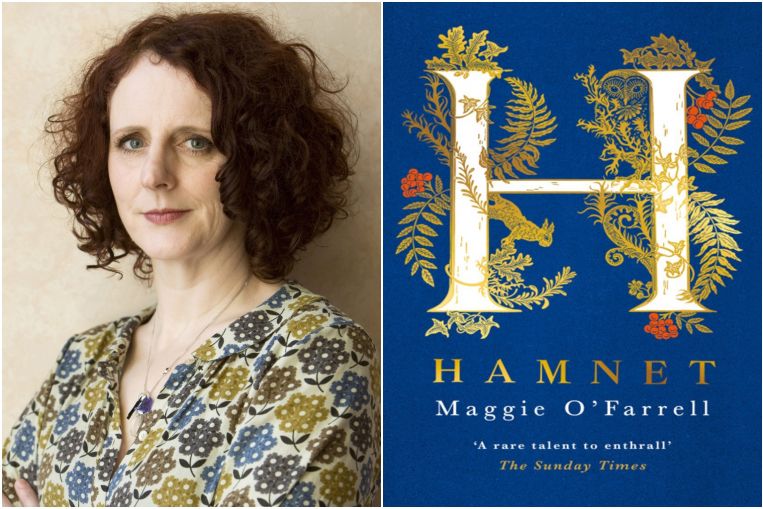Hamnet, Maggie O'Farrell's plague novel in a plague year, has won the 25th Women's Prize for Fiction.
The Northern Irish writer beat literary heavyweights Hilary Mantel and Bernardine Evaristo and three other authors to the £30,000 (S$53,300) prize, which was given out in a digital ceremony on Wednesday (Sept 9).
O'Farrell, 48, reacted with shock when chair of judges Martha Lane Fox revealed her win in a video call. "I feel like I want to run into the garden and howl at the moon," she said.
Fox called Hamnet an "exceptional winner", adding that it "expresses something profound about the human experience that seems both extraordinarily current and at the same time, enduring".
Hamnet, O'Farrell's eighth novel, reimagines the story of William Shakespeare's family, but avoids naming the famous playwright, focusing instead on his wife and children.
The name of his son Hamnet, who died aged 11 amid a bubonic plague outbreak, is interchangeable with that of one of his most famous plays, Hamlet.
O'Farrell, who is married to novelist William Sutcliffe, has a son and two daughters like Shakespeare did. The Guardian quoted her as saying she was unable to write Hamnet until her own son was well past the age of 11.
"I knew that I had to put myself inside the mind of a woman who sits at her son's bed and watches him die," she said. "And I just couldn't do it."
In an interview aired at the ceremony, judge and bestselling novelist Paula Hawkins praised a passage from the novel which depicts how the plague travelled from Alexandria to England via an infected flea aboard a ship.
O'Farrell said she had written that chapter two years ago, long before Covid-19 struck. "In the last six months, my relationship with (the novel) has altered.
"I feel closer to the characters, to the experience that Elizabethans must have undergone, because they were constantly terrified of this disease, among many others, and they would have constantly have been in what we now call lockdown repeatedly throughout their lives."
The prize, previously known as the Orange Prize and the Baileys Women's Prize for Fiction, was set up in 1996 to celebrate and promote international fiction by women throughout the world.
It recognises the best full-length novel of the year, written in English by a woman and published in the United Kingdom between April 1 last year and March 31 this year.
Previous winners include Zadie Smith for On Beauty, Chimamanda Ngozi Adichie for Half Of A Yellow Sun and Kamila Shamsie for Home Fire.
Read More – Source
Hamnet, Maggie O'Farrell's plague novel in a plague year, has won the 25th Women's Prize for Fiction.
The Northern Irish writer beat literary heavyweights Hilary Mantel and Bernardine Evaristo and three other authors to the £30,000 (S$53,300) prize, which was given out in a digital ceremony on Wednesday (Sept 9).
O'Farrell, 48, reacted with shock when chair of judges Martha Lane Fox revealed her win in a video call. "I feel like I want to run into the garden and howl at the moon," she said.
Fox called Hamnet an "exceptional winner", adding that it "expresses something profound about the human experience that seems both extraordinarily current and at the same time, enduring".
Hamnet, O'Farrell's eighth novel, reimagines the story of William Shakespeare's family, but avoids naming the famous playwright, focusing instead on his wife and children.
The name of his son Hamnet, who died aged 11 amid a bubonic plague outbreak, is interchangeable with that of one of his most famous plays, Hamlet.
O'Farrell, who is married to novelist William Sutcliffe, has a son and two daughters like Shakespeare did. The Guardian quoted her as saying she was unable to write Hamnet until her own son was well past the age of 11.
"I knew that I had to put myself inside the mind of a woman who sits at her son's bed and watches him die," she said. "And I just couldn't do it."
In an interview aired at the ceremony, judge and bestselling novelist Paula Hawkins praised a passage from the novel which depicts how the plague travelled from Alexandria to England via an infected flea aboard a ship.
O'Farrell said she had written that chapter two years ago, long before Covid-19 struck. "In the last six months, my relationship with (the novel) has altered.
"I feel closer to the characters, to the experience that Elizabethans must have undergone, because they were constantly terrified of this disease, among many others, and they would have constantly have been in what we now call lockdown repeatedly throughout their lives."
The prize, previously known as the Orange Prize and the Baileys Women's Prize for Fiction, was set up in 1996 to celebrate and promote international fiction by women throughout the world.
It recognises the best full-length novel of the year, written in English by a woman and published in the United Kingdom between April 1 last year and March 31 this year.
Previous winners include Zadie Smith for On Beauty, Chimamanda Ngozi Adichie for Half Of A Yellow Sun and Kamila Shamsie for Home Fire.
Read More – Source












